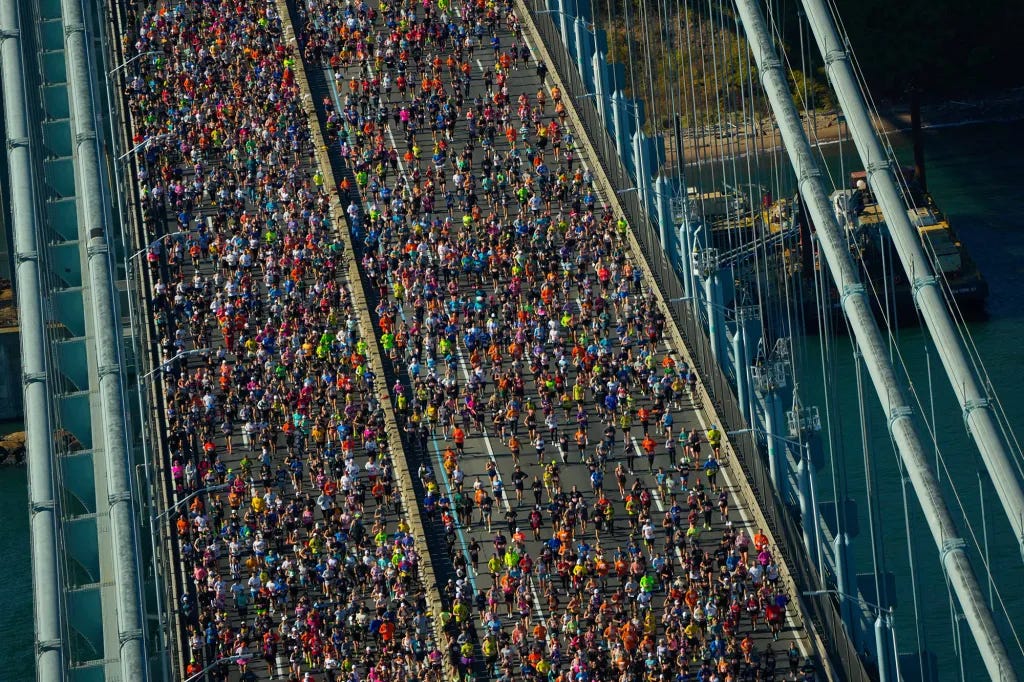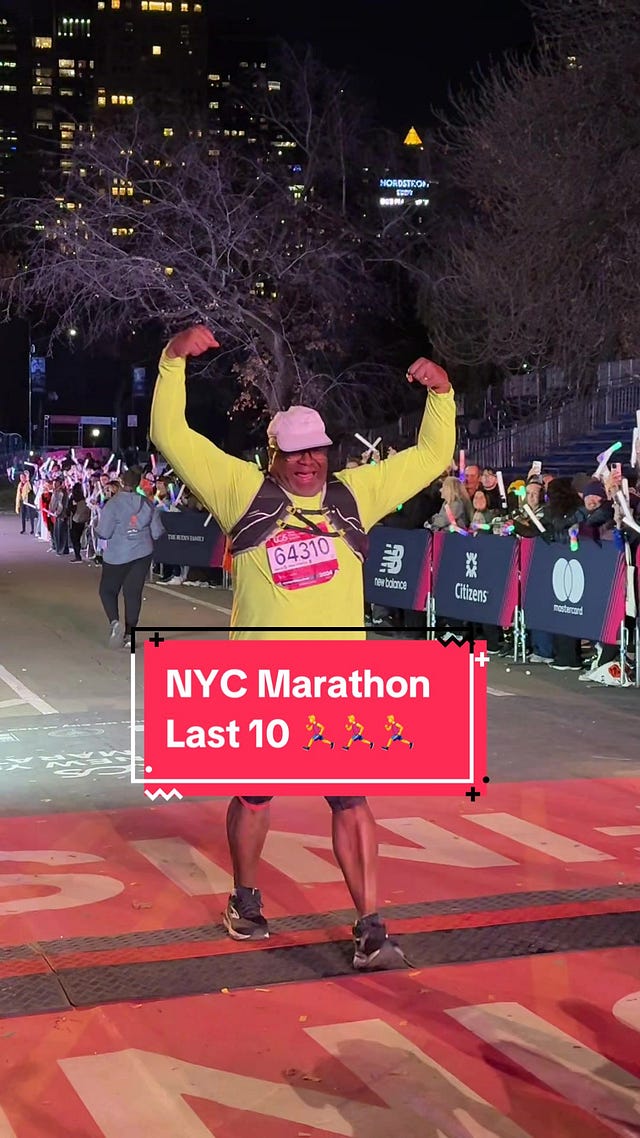A River Runs Through Us
11/7/24 - but the marathons have gotten longer

Hello everyone:
As always, please remember to scroll past the end of the essay to read some curated Anthropocene news.
Now on to this week’s writing:
I am disheartened this week, as I imagine many of you are. If the work ahead of us was already a marathon, now it looks to be a set of tasks both Herculean and Sisyphean.
I’ve been thinking about marathons as metaphors because I spent last weekend in New York, cheering on my son Harry and his friends as they ran the 54th NYC Marathon. It was a crowded, astonishing, wild, overwhelming, beautiful spectacle, a river of 55,000 runners flowing 26 miles through a constant crowd of cheering, supportive fans. All day long, as we stood in the crowd flanking the course at mile 7 in Brooklyn, then at miles 17 and 24 in Manhattan, I kept marveling at the scale of the task (both running the race and running the logistics) and at the scale of the fierce, fun love that emanated from both sides of the avenues.
Many of the people in the crowd, like us, were hollering cheerfully for family and friends, offering hugs and encouragement as they came by. But like us, everyone was also cheering for the steady river of strangers running the same race as those we love. That’s the marathon culture in NYC. Many runners had written their name in large letters on the front of their shirts, and the crowd responded like friends who knew and cared for them. At one point, I stood behind three young siblings who yelled each of those names in unison - “Go, Jake!” “You got this, Rachel!” - which rarely failed to help someone grin through the pain of pounding the pavement through five boroughs.
And then I drove home to Maine on the day before the election, optimistic that things would turn out well for life, liberty, and the pursuit of happiness. A few days later, still stumbling around for a way to write through the confusion, I came up with this synopsis:
We have voted to increase suffering, both human and more-than-human, across this planet.
I don’t want to increase your suffering… but here are a few paragraphs outlining some of what that means.
Abroad, the people of Ukraine are on the chopping block. Taiwan may be next. For Palestinians, if there was a chance of some reprieve with a Harris administration, it is gone. Family planning services across the globe that need deep and permanent funding will not find American public dollars.
At home, we’re likely to see quick and long-lasting federal action against immigrant communities, voting rights, health care, reproductive freedom, vaccines, free speech, and parts of the social safety net that has underpinned American life since FDR, to name a few. There is loose talk of upending the entire economy for working folks in order to benefit the half-witted and cold-hearted titans of our current gilded age.
Ecologically, it’s hard to calculate how profoundly this next administration will intensify the suffering of natural and human communities. Even if the increased global impact is only 0.5°C in the overall heating of the Earth, that’s tens of millions of displaced and diminished human lives and an increased likelihood of hitting planetary tipping points that cannot be untipped. The cry for a response to every desperate climate-addled event of the last several years, from hurricanes and floods to drought and heat domes, and from Amazonia to Antarctica, will fall on deliberately deaf ears. Wilderness areas and national monuments may lose protections. Project 2025 includes a very thorough plan to gut environmental regulations and the EPA.
We were already living in a time of environmental marathons, and the distance to the finish line in many of these races was already existential. The more we paid attention, the more marathons we knew we needed to run, and the more speed we knew we needed to run them. Decades had passed before we bothered to cross the starting line on reducing emissions and building a new energy system. And despite good efforts everywhere to protect the diversity of life on Earth - through conservation, rewilding, species and habitat protection, etc. - industry still takes us at least one step back every time science manages to move us two steps forward. Even the most remote and wild conservation areas receive rain contaminated with plastics and PFAS chemicals.
Now, with this election, we’re poised to reverse some of that marginal progress and delay - perhaps catastrophically - the vast amount of work that needs doing. The push to maximize oil and gas production, even on public lands, and the erasure of climate policy and clean energy incentives, will be early losses, followed closely by the hollowing out of scientific staff from multiple federal agencies. I may be wrong, but I believe that few of us (including me) really understand how much this incoming administration will erode the relationship between governance, science, and ecological sustainability.
So yes, we have voted to increase suffering. But as any Buddhist, feedlot cow, debeaked chicken, war-orphaned child, or the extremely impoverished 9% of humans living on less than $1.90 per day can tell you, suffering is normal. For those of us who have spent our lives in stable democracies, and who live at the top of the human pyramid, it’s easy to forget that.
If you don’t think you’re wealthy, remember that the top 1% of global wealth starts at $60,000 a year for an individual, $130,000 for a couple with one child. An American unable to make ends meet on minimum wage - about $15,000 a year - is still in the richest 14%. (Check out this calculator - How Rich Am I? - from philanthropy group Giving What We Can.)
And we must admit that voting to increase suffering happens all the time too, if not often on this scale. Really, we’ve been doing it in every Anthropocene generation, right? Over the last two centuries, the number of nations led by democratic governments has increased dramatically even as those nations voted to dramatically disrupt ecologies and violate multiple planetary boundaries.
So the onset of a 2nd Trump presidency, with all of its dark implications, also signifies that even those of us who have been relatively unscathed by the burning world will now suffer some of the helplessness and despair that is common across human history and human experience.
The solution, then, is to keep running all the marathons, despite the headwinds, and to help each other pick up the pace wherever we can. Here in the U.S. we should do so knowing that, for many of us, our quotient of suffering is still far below what most of our fellow humans and fellow species have dealt with for a long time.
Before we dream of finish lines, though, we all need to read the Project 2025 plan to disrupt environmental care and governance. It’s not fun, but it’s necessary. It doesn’t have to be right now, though. It’s a hard week. When you’re ready, the best place to start is Kollibri terre Sonnenblume’s latest piece, which provides an overview and a list of resources. And there’s my essay, “Project 2025 in the Real World.” What you’ll learn is brutal, but it’s the future we need to plan on and fight against. As with everything in the Anthropocene, this is the world we’ve made, and it’s our obligation to undo it as best we can.
Harry was running as part of “Fred’s Team,” raising funds to support cancer research at Memorial Sloane Kettering Cancer Center. A year ago, the love of his life died of ovarian cancer. Katie was a beautiful, wonderful, compassionate, brilliant young woman who was fiercely loved by everyone who knew her, and who took an accelerated Masters program in social work after her diagnosis so that she could devote her life to helping children and teens exposed to trauma.
I’m proud of Harry for the accomplishment, for the devotion to the cause and to Katie, and for being part of a team that suffered to do the right thing. At mile 17, he gave me a quick hug and said, with a grin, “This fucking sucks!” before rushing off to rejoin the river of humanity.
And that river of humanity is all I can leave you with right now. I don’t have an abundance of optimism to share or spread. What I have is the marathon metaphor to help you and me align the Anthropocene struggle with this new political reality. Suffering has been chosen, and so the course ahead will entail even more suffering than we expected. It will, at times, fucking suck. But the river of humanity is the vast majority of us who share the same desire for healthy societies and a healthy world, whatever our politics. The river that runs through us is compassion, even if this election suggests otherwise.
In closing, let me turn to Barry Lopez, as I so often have during the three and a half years I’ve been writing the Field Guide, for some guidance (thanks to David B. Williams at
for reminding me of the quote). Lopez writes some advice in his final book, Embrace Fearlessly the Burning World, that seems particularly designed for this moment:To survive what’s headed our way — global climate disruption, a new pandemic, additional authoritarian governments — and to endure, we will have to stretch our imaginations. We will need to trust each other, because today, it’s as if every safe place has melted into the sameness of water. We are searching for the boats we forgot to build.
Elsewhere, as I’ve looked for footing amid the upset, I’ve found a few things worth passing on:
From Jimmy Kimmel, the late night host, after the election:
“It was a terrible night for women, for children, for thousands of hard-working immigrants, for health care, for our climate, for scientists, for journalists, for justice, for free speech. It was a terrible night for poor people, for seniors who rely on Social Security, for Ukraine, for NATO and democracy and decency. It was a terrible night for everyone who voted against him and guess what? It was a bad night for everyone who voted for him too, they just don’t realize it yet.”
From
, whose new book On Tyranny: Twenty Lessons from the 20th Century should probably be on all of our reading lists, his lesson #1 for opposing authoritarianism:Do not obey in advance. Most of the power of authoritarianism is freely given. In times like these, individuals think ahead about what a more repressive government will want, and then offer themselves without being asked. A citizen who adapts in this way is teaching power what it can do.
And from the great
, post-election in his climate fight newsletter The Crucial Years, finding a glimmer from the morning sun amid the gloom:And in that sunrise there is for me the hint of where that next huge realigning New Deal-sized thing will come from. The reshaping of our energy system—to cope with climate change, and to reflect the rock-solid fact that we live on an earth where the cheapest way to make power is to point a sheet of glass at the sun—may offer, if we are clever and good-hearted, a new basis on which to remake the world.
More local, more peaceful, less controllable by oligarchs and plutocrats. I don’t know if we can make it—the headwinds are stronger than they were yesterday—but I know we can try. And I know that only this project is big enough in scale to give us a real chance at a fresh start.
And finally, from Sam Matey at
and , a post simply titled “Morning,” his post-election reminder of how much amazing good work has occurred, is going on, and will continue to be done in the face of this demoralizing election, especially in the arena of clean energy. This graphic, from Our World in Data, was a particularly good reminder of the positive trend in human affairs over the last two centuries, despite the tragedies of fascism and world wars and myriad other causes of suffering. (I heartily recommend subscribing to Climate Action Now and their Daily Dose of Climate Hope for their invitations to act for a better world.)And for something more immediately inspirational, here are the final ten finishers of the 55,000 people who ran the NYC Marathon, arriving in the dark many hours later but still being wildly cheered by a crowd who refused to go home until the job was done:
Thanks for sticking with me.
In other Anthropocene news:
From the BBC, activists are working hard to reduce the climate and water impacts of data centers.
is starting a podcast called Solving For Climate over at Sustainability by Numbers.From Heated, “1.5C is Dead. The Climate Fight Isn’t.”
From Inside Climate News, since Antarctica plays such a major role on a warming Earth, maybe it’s time to give it a voice in the global discussion about climate by naming the continent an autonomous legal entity.
From Yale e360, a push in Brazil to develop a “bioeconomy,” in which harvesting from an intact, biodiverse rainforest is more common and more profitable than cutting the forest down.
From Anthropocene, using trained giant African rats to sniff out rhino horns, elephant tusks, and other wildlife contraband in the fight against poaching.
From Volts, a podcast on Solutionary Rail, a vision of the many ways railroads can be vital to a cleaner future, despite a long history of neglect of the system and its public obligations.









"We have voted to increase suffering, both human and more-than-human, across this planet."
Jason, thank you making a sentence out of so much nonsense. You have saved me time that I would have frittered away trying to find logic where there is none. Now, still reeling from Hurricane Helene, I have to come to terms with the enormous number or obstacles, and the level of suffering.
I sort through the Rights of Nature movement that you, Kollibri, and I discussed last week. I don't know if I have what it takes to fight that fight. I continue to think through Trish O'Kane's approach in Birding To Change the World ~ the story of moving forward in community, acting as if the Right has been legally established. It's weird to even consider that we need legal backing for nature, yet obviously we do.
For now, I'm reading Discovering the Unknown Landscapes: A History of America's Wetlands by Ann Vileisis, Island Press, 1997 (recommended by Trish O'Kane).
Jason, thank you for your work. in kinship, Katharine
"It was the best of times, it was the worst of times, it was the age of wisdom, it was the age of foolishness, it was the epoch of belief, it was the epoch of incredulity, it was the season of Light, it was the season of Darkness, it was the spring of hope, it was the winter of despair, we had everything before us, we had nothing before us, we were all going direct to Heaven, we were all going direct the other way--in short, the period was so far like the present period that some of its noisiest authorities insisted on its being received, for good or for evil, in the superlative degree of comparison only." -C Dickens, A Tale of Two Cities
A new golden age is coming- brought to us by our sciences and greater understanding but its birth will be made difficult by the forces of greed and ignorance. Many will die, a great many I fear. Those in this election past who voted for suffering may have thought they were voting for less suffering, more affordable lives, greater freedoms of the narrow types they craved. But they didn't think deeply. They seldom do.